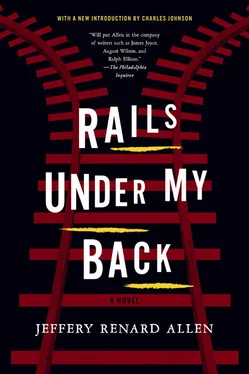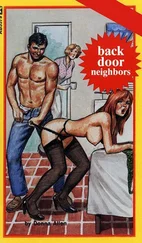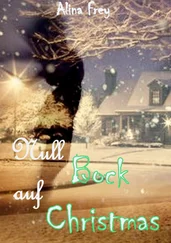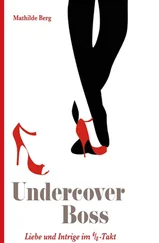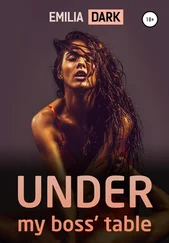It ain’t worth the time and trouble.
I’ll hire us a lawyer.
I don’t want to go to court. For this old house.
But, Mamma—
Hush. It ain’t worth the time or the trouble.
FOR THE FIRST TIME IN MEMORY, she saw the lil house stationed on grass not concrete, the trailer hitched behind a brand-new truck on the red gravel road before Lula Mae’s house. Gracie had sold the lil house for a hundred dollars to Lula Mae’s daily hospital transport.
I gave him a good deal, Gracie said. Since he was good to Lula Mae.
The truck and the lil house pulled away, leaving a thin gown of dust.
Gracie sold Lula Mae’s stereo (for a dollar) to Lula Mae’s best friend, an old lady with hands like a man, wearing a hearing aid like a spy. She sold Lula Mae’s kerosene lamps, flower-rimmed plates, crystal pitcher and glasses, bread box, spice holder, red metal kitchen chairs and matching table. She sold the meat freezer for twenty-five dollars, frozen meat included. She sold the dishwasher, washing machine, and dryer (seventy-five dollars for the set).
Two middle-aged white women — daughters of Lula Mae’s employers, kin of Mr. Byron, the white man who knew the Griffith family graves the way he knew his teeth — rushed through the house grabbing up everything in sight, like a tornado. Glass figurines, decorative baskets, vases, ashtrays, place mats, plates, and anything else Gracie had not sold.
Together they lifted a stunned and immobile Porsha off her feet. Hatch stayed their hands. They put Porsha down. Said, We jus wan something to member Lula Mae by.
MAMMA AND GRACIE fought for possession of the quilt, tugging at it, an angry game. A store-bought pattern — a tattered circus clown, once bright patchwork colors against a dull yellow background — now frayed at the edges that Lula Mae had sewn together in a matter of hours and stuffed with store-bought stuffing, an everyday quilt to keep you warm at night, protection against the air conditioner’s winter cold. (Gracie had sold the air conditioner for twenty-five dollars.)
YOU SAY IT’S FUN?
Porsha thought about a favorable way to describe her line of work. Nothing came to mind. What about you?
Reverend Blunt smiled. There’s no better job.
It must run in your family.
Why do you say that?
Ain’t that how most people start?
He laughed. I guess so. I guess that is how they start. You must go to work and prepare the way of the Lord, he said in a deliberate humming preacher’s voice.
She found it hard to laugh, laughter pinned down by everything heavy inside her.
It’s a hard time for you. I know it is. Miss Pulliam was a special woman, very special.
His eyes were clear and kind, free open space.
Thanks.
I can—
She stopped him. I would like to. I really would. But to tell you the truth, she pushed the words up from inside her, I’m seeing somebody.
Reverend Blunt said nothing for a moment, his eyes showing no change. Well, he said, I hope he seeing you too. It never works when one person is invisible.
He said it the same way he said everything else, without malice or sarcasm. She listened and accepted it and thought about it and thought about other things she was thinking through and sat saying nothing not knowing what to say. Sat smelling the new car leather, supportive, firm against her body, Reverend Blunt smiling into her face— got to admit, he is the perfect gentleman, ain’t looked at my body once, short skirt and all —the air conditioner blowing cool in the silence. How long had they been sitting here and talking? one hour? Two?
Sun shattered in flakes against the windshield. The reverend’s mouth moved but she missed the words.
He was handsome, yes oh so handsome — but she found it hard to hear what he was saying. The sediment of the past floated to the top of her still memory. Memories thicker than a snowstorm, free-floating in the reverend’s car, a single, contained space, a Christmas paperweight. His mouth moved again.
What was that?
I said why don’t we drive to Memphis? Take your mind off things.
No. I really would like to. I really would. You are so sweet. But I better stay close to the house. In case they need me. You understand.
Of course. As it should be.
Reverend Blunt opened his door and exited the car, rocking it with his strength. He came around the front of the car slowly, giving her ample opportunity to observe him, take him all in and appreciate. He opened her door, took her hand, and helped her out of the car.
Well, he said, it has been a pleasure.
The same.
He held her hand, his eyes watching and holding. She read his heart in his handclasp. Well, I better be going.
Yes, he said. That is the proper thing to do. He kissed her hand. Under different circumstances we might have—
Yes.
He pulled her closer. She leaned and took his kiss as if it were her rightful due. Kissed him until the pleasure began to send her.
She turned to the house and made it to the front porch when he called her.
Oh, Porsha. Let me give you this. He crossed the small bridge over the grass-covered drainage ditch and waited for her on the road side of the chain-link fence. She walked to the fence slowly but without hesitation.
I’ll be in the city in a few weeks for a mortuary convention. This is where I’ll be staying. He extended a business card.
She took it and read it carefully. She turned for the house. Walked on in the fresh sunlight.
SOMEBODY TOLD YOU WRONG, Beulah said. I ain’t never been po. Daddy always said, When you needy, eat the skin of a cow.
Porsha wondered if he meant this literally.
Yeah, Sam was a devil alright. But Mamma and Daddy couldn lay a hand on him. Our animals fight them. Our pigs and cows wouldn let Mamma and Daddy lay a hand on nwine one of us kids. Beulah’s lungs wheezed above her words.
How you feel today, Beulah?
I had everything. Cancer. Stroke. Heart attack. Hypertension. Asthma. Diabetes. Arthritis. I feel as good as I should feel. What else is left? I’m too old to get the clap.
Porsha did her best to laugh. She had it in her somewhere. She wanted to laugh with Beulah, for her. Lil Judy, Jacky, and Rochelle had stayed in Fulton where grave and gravity conspire. Had promised to come up in a day or two to bring Beulah back to St. Paul — and her nursing home bed — where all four lived. Beulah had bought them all plane tickets. In her Decatur house, she had raised the three girls as her own. Their mamma, Jesse, just thirteen when she had Rochelle, thirteen with the chaotic brain of a five-year-old, a parentless drinking fool, made worse when a stroke shriveled up the left side of her body, threw her red eyes out of balance (one up, the other down, like losing cherries in a slot machine), shortly after the birth of her last child, Lil Judy. And their father, Dave, Beulah’s nephew, Big Judy’s son, ran the street with his uncle, Beulah’s younger and only brother Sam, two stray dogs. So she had raised them as her own.
How come Beulah never had any kids?
I don’t know. Maybe she already had enough to handle.
You ain’t married yet?
I’m looking. I’m trying.
Well, take yo time. Don’t be in no hurry. Soon as they get some pubic hair, folks figure they old enough to marry.
NO. LULA MAE AIN’T HAVE NO MONEY, and I aint’s have none either. So we was gon ask Mr. Harrison to ship him. Never did. He had done enough.
Hatch thought about it. And he would do that?
Yes.
Why?
Kind.
What?
Kind. He kind. That was the best white man that ever lived.
I wouldn’t go that far.
I would.
Hatch examined his shoes. Patterns there. So how was he gon ship him? Plane?
Читать дальше
